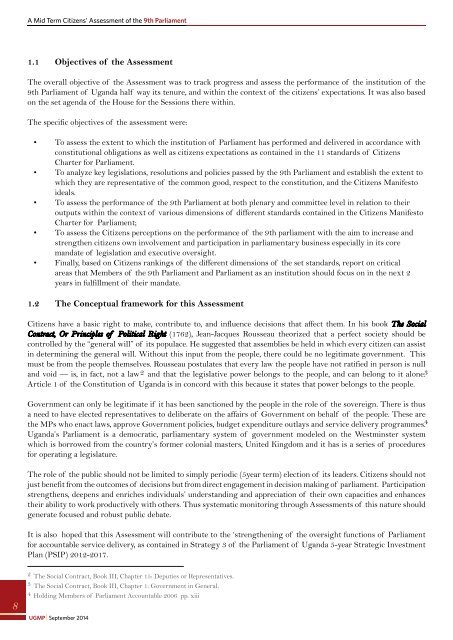Parliament-Watch-Bulletin_Mid-Term-Audit-2014
Parliament-Watch-Bulletin_Mid-Term-Audit-2014
Parliament-Watch-Bulletin_Mid-Term-Audit-2014
You also want an ePaper? Increase the reach of your titles
YUMPU automatically turns print PDFs into web optimized ePapers that Google loves.
A <strong>Mid</strong> <strong>Term</strong> Citizens’ Assessment of the 9th <strong>Parliament</strong>1.1 Objectives of the AssessmentThe overall objective of the Assessment was to track progress and assess the performance of the institution of the9th <strong>Parliament</strong> of Uganda half way its tenure, and within the context of the citizens’ expectations. It was also basedon the set agenda of the House for the Sessions there within.The specific objectives of the assessment were:• To assess the extent to which the institution of <strong>Parliament</strong> has performed and delivered in accordance withconstitutional obligations as well as citizens expectations as contained in the 11 standards of CitizensCharter for <strong>Parliament</strong>.• To analyze key legislations, resolutions and policies passed by the 9th <strong>Parliament</strong> and establish the extent towhich they are representative of the common good, respect to the constitution, and the Citizens Manifestoideals.• To assess the performance of the 9th <strong>Parliament</strong> at both plenary and committee level in relation to theiroutputs within the context of various dimensions of different standards contained in the Citizens ManifestoCharter for <strong>Parliament</strong>;• To assess the Citizens perceptions on the performance of the 9th parliament with the aim to increase andstrengthen citizens own involvement and participation in parliamentary business especially in its coremandate of legislation and executive oversight.• Finally, based on Citizens rankings of the different dimensions of the set standards, report on criticalareas that Members of the 9th <strong>Parliament</strong> and <strong>Parliament</strong> as an institution should focus on in the next 2years in fulfillment of their mandate.1.2 The Conceptual framework for this AssessmentCitizens have a basic right to make, contribute to, and influence decisions that affect them. In his book The SocialContract, Or Principles of Political Right (1762), Jean-Jacques Rousseau theorized that a perfect society should becontrolled by the “general will” of its populace. He suggested that assemblies be held in which every citizen can assistin determining the general will. Without this input from the people, there could be no legitimate government. Thismust be from the people themselves. Rousseau postulates that every law the people have not ratified in person is nulland void — is, in fact, not a law 2 and that the legislative power belongs to the people, and can belong to it alone. 3Article 1 of the Constitution of Uganda is in concord with this because it states that power belongs to the people.Government can only be legitimate if it has been sanctioned by the people in the role of the sovereign. There is thusa need to have elected representatives to deliberate on the affairs of Government on behalf of the people. These arethe MPs who enact laws, approve Government policies, budget expenditure outlays and service delivery programmes. 4Uganda’s <strong>Parliament</strong> is a democratic, parliamentary system of government modeled on the Westminster systemwhich is borrowed from the country’s former colonial masters, United Kingdom and it has is a series of proceduresfor operating a legislature.The role of the public should not be limited to simply periodic (5year term) election of its leaders. Citizens should notjust benefit from the outcomes of decisions but from direct engagement in decision making of parliament. Participationstrengthens, deepens and enriches individuals’ understanding and appreciation of their own capacities and enhancestheir ability to work productively with others. Thus systematic monitoring through Assessments of this nature shouldgenerate focused and robust public debate.It is also hoped that this Assessment will contribute to the ‘strengthening of the oversight functions of <strong>Parliament</strong>for accountable service delivery, as contained in Strategy 3 of the <strong>Parliament</strong> of Uganda 5-year Strategic InvestmentPlan (PSIP) 2012-2017.82 The Social Contract, Book III, Chapter 15: Deputies or Representatives.3 The Social Contract, Book III, Chapter 1: Government in General.4 Holding Members of <strong>Parliament</strong> Accountable 2006 pp. xiiiUGMP September <strong>2014</strong>


